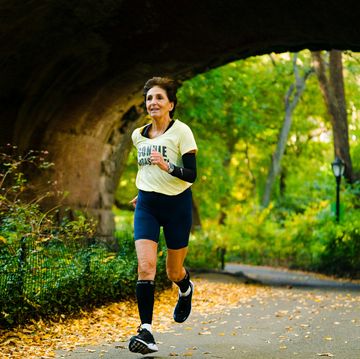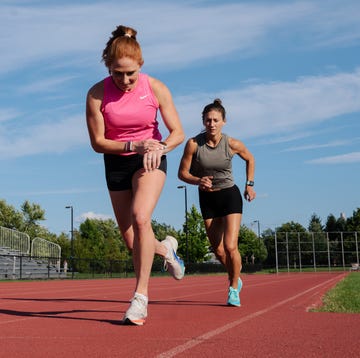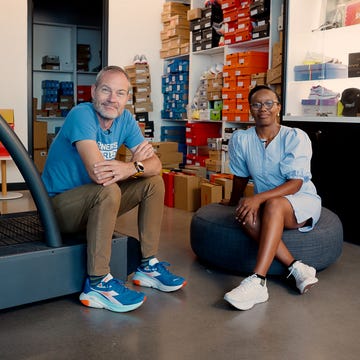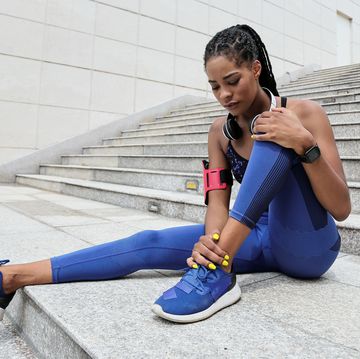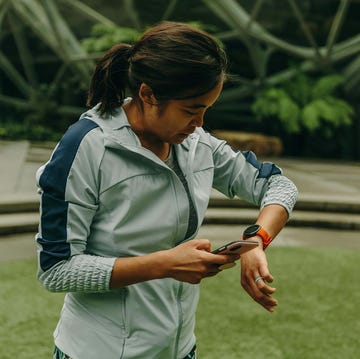- Diabetes can run in families. But there are ways to avoid it.
- Diabetes can cause circulation and nerve problems, which can lead to foot infections and, in some cases, amputation.
- Examining your family health history can be a wakeup call to start a running program.
AT THE END of 2022, I sat down with myself to reflect on the changes I wanted to implement and set the priority to embark on a fitness journey in the new year. After an eye-opening moment a few days prior, I calculated that my BMI put me in the obese category (although I now know the stat alone isn’t an accurate indicator of health). That, combined with seeing a pattern of genetic health disorders throughout my family and fearing this reality could be my very own, I knew it was time to get healthy. I hit the gym three times the week before the holidays, with the intention to get the wheels turning on this new habit right away so that I would be spared the curse of failed New Year’s resolutions.
I had never been fit or the athletic type. The Pakistani cuisine my family was used to overseas—high in fats and oil, large in portion sizes, and lacking vegetables—remained a staple after my family immigrated to the United States when I was 2. I didn’t play sports in school. Outside of the fact that modesty is an important part of my culture and faith and is at odds with sports clothes, my family also had other priorities. Dad always said, “Your studies are the most important, and that’s it.” Negotiating simple friend hangouts with my parents always involved sprinkling in some white lies such as, “Yes, we’re totally working on that school project” (sorry, Mom and Dad), so the idea of signing up for, say, a softball league to play with my friends was never really on the table. Sports was an overlooked hobby in my household—unless we screamed at the TV when our cricket team was losing a match.
I never thought of my family as “unfit,” although I knew my relatives had health issues. My mom has been diabetic for as long as I can remember; the disease ran in her side of the family. Ever since I was a child, there was always a designated cabinet in the kitchen filled with transparent orange Rx bottles, with prescription names I could never pronounce and neither could my Urdu-speaking mother. She would remember which ones to take by the shape and color of each pill. As a symptom, the bottoms of her feet, covered in dry, cracked skin, would get swollen after walking for too long, and I’d have to slow down my stride to match her pace.
My mom’s younger brother, my mamu (uncle, in Urdu), also had diabetes. My mom got a call from Pakistan in 2019 that he was in a hospital. Due to his unhealthy lifestyle and the severity of the disease, doctors had to amputate his leg.
Mamu and I were close even over the distance. In addition to coming from a modesty culture, I was never a girly-girl, and being expected to wear revealing dresses like my classmates was the one reason I never went to any school dances throughout high school. But Mamu was a tailor, and for my senior prom, he sent a dress from Pakistan he designed for me, making me comfortable enough to go and turning it into one of the best nights of my life.
Now, whether it was because of a postoperative complication or his consciousness coming to terms with his new reality, my mamu never left the hospital and, at only 52, passed away a few days after surgery. As I sat with my mom, both of us mourning his death from 7,000 miles away, the generational health issue hadn’t tripped any alarms in my head. I didn’t yet understand how my family’s genetics applied to my own lifestyle.
After graduating college and while living at home postpandemic, I became very sedentary. I could feel the lack of fitness in all aspects of my life, be it getting winded on an easy hike with my partner, noticing the bottoms of my feet swollen and dry like my mother’s, or feeling the scariest heart palpitations from simply walking up the stairs or getting off the couch.
Then, in December 2022, I had a moment of reflection. A literal reflection. For our three-year anniversary, my partner and I filmed a video blog of our entire day, from walking around Philly and grabbing our usual lattes at Elixir Cafe, to playing a round of billiards at Round1, to returning home, where I cooked us dinner before ending the night with a movie. It wasn’t until the next day during editing that I noticed myself—or was it even me? Who was this person? I didn’t recognize myself anymore. Every experience that had been warning me to take care of myself came flooding over me. It finally clicked. Something needed to change—and change fast.
By no means has it been the perfect journey, but I lost about 30 pounds since and completed two half marathons—wearing shorts, since I know now that my faith and culture isn’t tied to only the clothes I wear. I’m learning to love cooking in a nutritious way and figuring out how to balance a 9 to 5 with lifting and running. But most importantly, I’m remembering to have fun, so I can sustain this lifestyle for the rest of my life (without skipping my mom’s delicious home-cooked meals while visiting).
My mom has also gone through a bit of a transformation in the last few years. She has learned how to fuel her body with healthy foods, lost 30 pounds herself, and is building up her walking endurance for our future trip to London.
After my second half marathon, she asked me—in a true immigrant mom fashion—“Did you win?” And in my perspective, yes, I did.

Saba Ahmed has been telling stories—with a camera, pen, or curated playlist—for nearly a decade. She hopes to surpass last year’s 30,582 total listening minutes while mixing her love of music with running. She ran the Pittsburgh Marathon, her first, in May of 2025.







